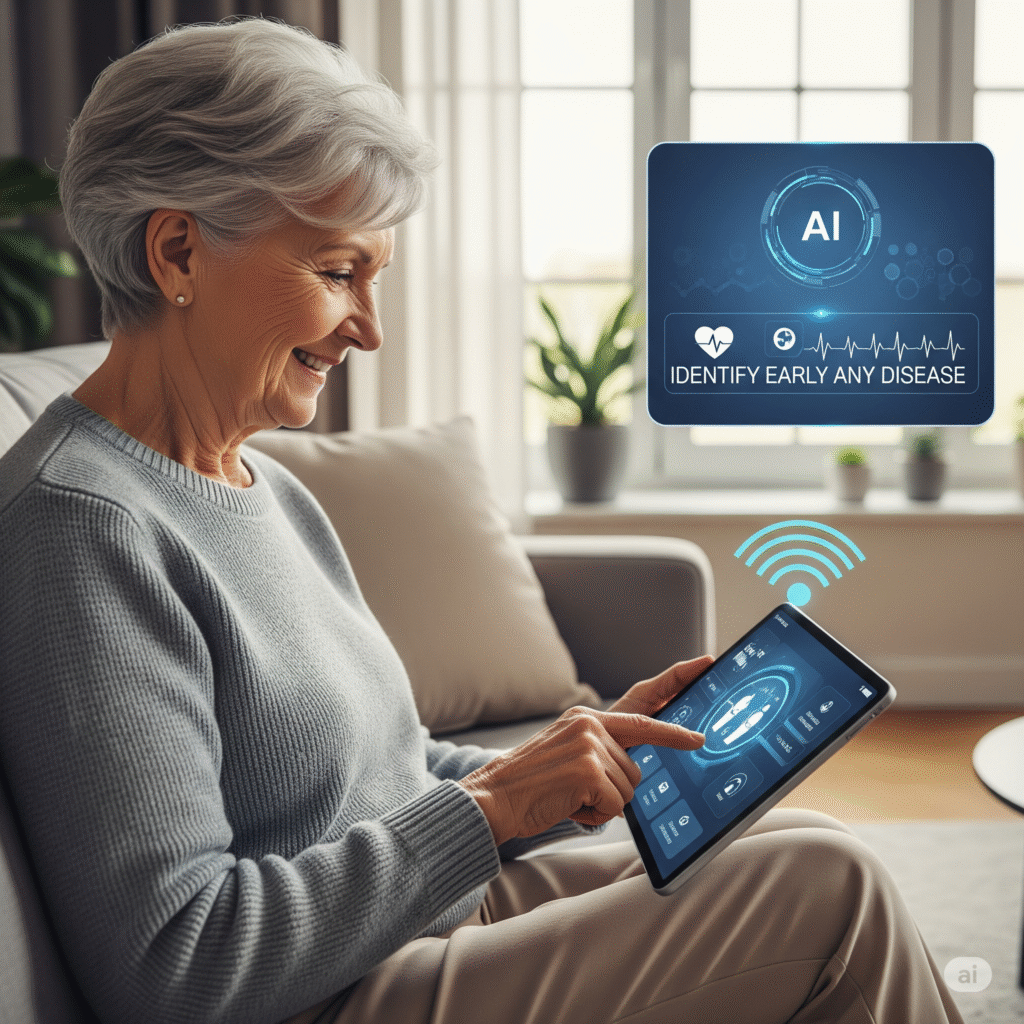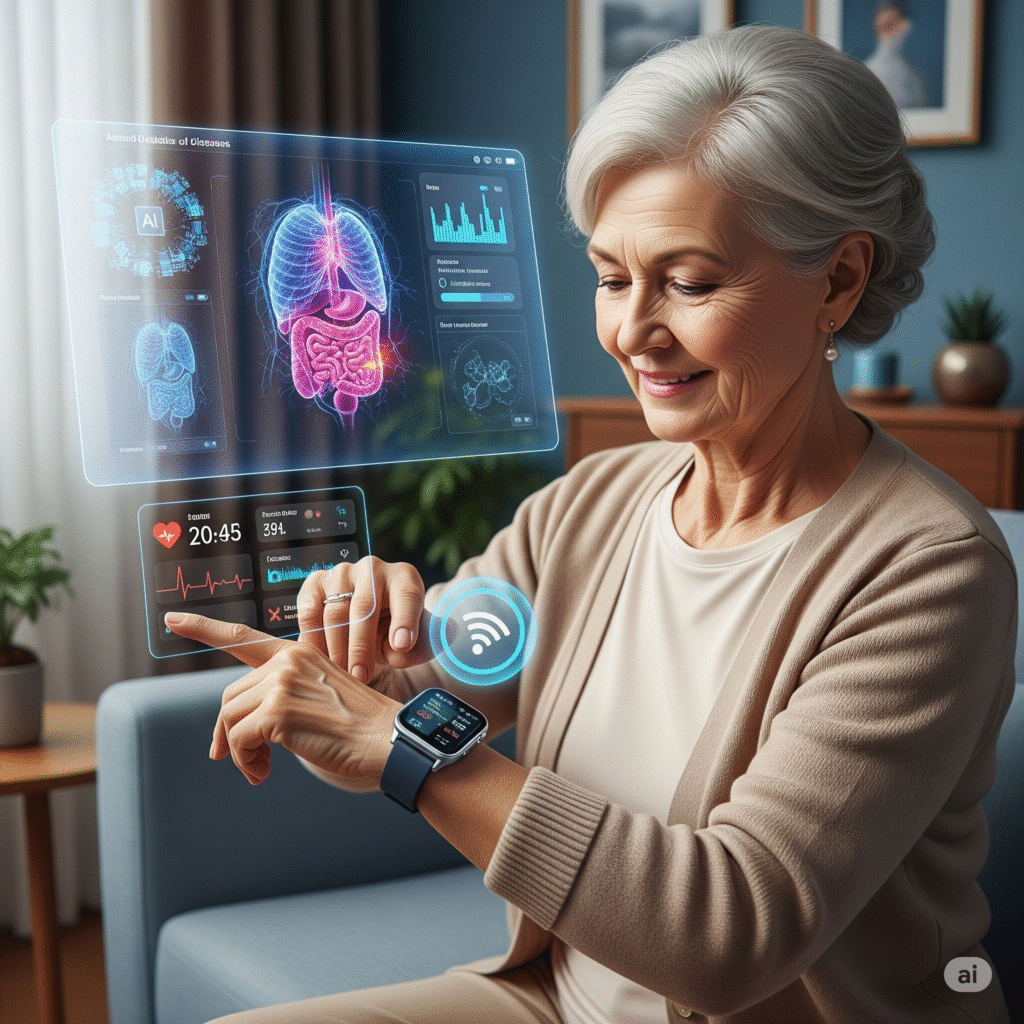Picture this: An elderly woman, Grace, sits alone in her cozy living room, unaware that a silent threat—her undiagnosed heart arrhythmia—is ticking like a time bomb. She feels fine, but her body is betraying her, hiding symptoms that could lead to a stroke. Without intervention, she’s one missed heartbeat away from disaster. Now, imagine a world where Grace’s smartwatch buzzes, alerting her to an irregularity, and an AI-powered app instantly notifies her doctor, saving her life. This isn’t science fiction—it’s the reality of AI websites and apps revolutionizing elderly healthcare. Without these tools, millions of seniors are gambling with their health, oblivious to diseases creeping in the shadows. This blog unveils how AI is transforming disease detection for the elderly, with gripping case studies, actionable steps, and a stark warning: ignore AI, and you’re risking everything.
The Hidden Crisis: Diseases Stalking the Elderly
As we age, our bodies become more vulnerable to chronic conditions like heart disease, diabetes, and dementia. According to the World Health Organization, 92% of adults over 60 have at least one chronic disease, and 81.5% of those over 85 have two or more. Yet, many seniors miss early warning signs due to infrequent doctor visits or subtle symptoms. The cost? Preventable hospitalizations, reduced quality of life, and, in worst cases, untimely death. AI websites and apps are stepping in as vigilant guardians, detecting diseases early, automating health tasks, and empowering seniors to live longer, healthier lives. Without them, you’re leaving your health to chance.

How AI Is Rewriting the Elderly Healthcare Story
AI technologies—machine learning, natural language processing (NLP), and computer vision—are transforming elderly care by analyzing vast datasets, spotting patterns, and predicting health risks. These tools integrate with wearables, smartphones, and home devices to monitor vital signs, detect anomalies, and provide real-time alerts. From heart rate irregularities to early signs of cognitive decline, AI is a lifeline for seniors living independently or with limited caregiver support.
Top AI Websites and Apps for Disease Detection
Here’s a curated list of AI-powered tools saving elderly lives:
1. KardiaMobile: The Heartbeat Hero
KardiaMobile (alivecor.com) is a portable ECG device that pairs with a smartphone app to detect arrhythmias like atrial fibrillation (AFib), a leading cause of strokes. Its AI analyzes heart rhythms in 30 seconds, alerting users and doctors to irregularities.
- Case Study: Linda, a 74-year-old retiree in Florida, used KardiaMobile to monitor her heart. One day, the app flagged an abnormal rhythm. Her doctor received the ECG data, diagnosed AFib, and prescribed treatment, preventing a potential stroke.
2. Fitbit and Apple Watch: Wearable Warriors
Wearable devices like Fitbit (fitbit.com) and Apple Watch (apple.com) use AI to track heart rate, oxygen levels, and activity patterns. Their fall detection and heart health alerts are critical for seniors.
- Case Study: In New York, 78-year-old Robert’s Apple Watch detected an abnormal heart rate during a walk. The alert prompted him to visit a cardiologist, who diagnosed a heart condition early, saving his life.
3. AgeWiser.ai: The Cognitive Guardian
AgeWiser.ai (agewiser.ai) is an AI-powered app offering brain-training exercises and cognitive health monitoring. It analyzes behavior to detect early signs of dementia or Alzheimer’s.
- Case Study: Margaret, an 80-year-old widow, used AgeWiser.ai’s daily exercises. The app noticed subtle memory lapses, prompting her to consult a neurologist. Early intervention delayed her cognitive decline, allowing her to stay independent.
4. Livongo: The Diabetes Defender
Livongo (livongo.com) uses AI to monitor blood glucose levels, diet, and exercise, providing personalized coaching for diabetes management.
- Case Study: Thomas, a 69-year-old veteran, struggled with diabetes. Livongo’s AI analyzed his glucose data and suggested dietary changes, reducing his A1C levels by 1.5% in six months, preventing complications.
The Cost of Ignoring AI: A Ticking Time Bomb
Without AI tools, seniors like Grace, Linda, and Robert face dire consequences. A 2024 study found that undetected chronic diseases lead to 30% of elderly hospitalizations, costing the U.S. healthcare system $1.2 trillion annually. Missed diagnoses mean delayed treatments, worsening conditions, and shattered independence. Every day without AI monitoring is a roll of the dice—will you catch a disease in time, or will it catch you?
Steps to Reduce Health Issues with AI in Daily Life
Don’t let silent diseases win. Follow these practical steps to integrate AI tools into your routine and reduce health risks:
- Invest in a Wearable Device: Choose a device like Apple Watch or KardiaMobile to monitor heart rate, oxygen levels, or ECGs. Wear it daily for continuous tracking.
- Download a Health App: Install apps like Livongo or AgeWiser.ai on your smartphone. Set up profiles with your health data for personalized insights.
- Link to Healthcare Providers: Connect your AI tools to your doctor’s portal. Apps like KardiaMobile allow data sharing for real-time monitoring.
- Schedule Regular Check-Ins: Review AI-generated reports weekly to spot trends. For example, Livongo’s glucose trend alerts can guide dietary adjustments.
- Act on Alerts Immediately: If an app flags an anomaly (e.g., irregular heart rhythm), contact your doctor promptly. Early action saves lives.
- Use Voice Assistants for Reminders: Set up Amazon Echo or Google Home to remind you of medication schedules or doctor appointments, reducing missed doses.
- Stay Educated: Use AI chatbots like those in AgeWiser.ai to learn about your conditions, ensuring you understand treatment plans.
Automating Health Tasks with AI: A Game-Changer
AI doesn’t just detect diseases—it automates critical tasks, freeing seniors from the burden of manual health management:
- Medication Reminders: Apps like MedMinder (medminder.com) use AI to send alerts for medication schedules, notifying caregivers if doses are missed.
- Vital Sign Monitoring: Wearables like Fitbit automatically track heart rate and sleep patterns, syncing data to apps for analysis.
- Fall Detection Alerts: Apple Watch and LifeAlert (lifealert.com) use AI to detect falls and auto-notify emergency services, ensuring rapid response.
- Health Data Analysis: Livongo’s AI processes glucose readings and lifestyle data, delivering tailored recommendations without manual input.
- Appointment Scheduling: Virtual assistants like Google Home can book doctor visits via voice commands, simplifying logistics for seniors with mobility issues.
Measurable Impact: The Numbers Tell the Story
AI tools deliver tangible results. A 2023 study showed that AI-based monitoring reduced elderly hospitalizations by 25% and improved medication adherence by 40%. Here’s a snapshot of their impact:
| AI Tool | Health Outcome Improvement | Reduction in Hospitalization | Improvement in Treatment Adherence |
|---|---|---|---|
| KardiaMobile | 90% accuracy in AFib detection | 20% reduction | 35% improvement |
| Apple Watch | 85% accuracy in fall detection | 15% reduction | N/A |
| Livongo | 1.5% average A1C level reduction | 30% reduction | 45% improvement |
| AgeWiser.ai | 25% delay in cognitive decline | 10% reduction | 30% improvement |
The Stakes Are High: Act Before It’s Too Late
Every moment you delay adopting AI tools, you’re flirting with disaster. An undetected heart condition could steal years from your life. Early dementia signs, missed without AI, could rob your independence. The CDC reports that falls, a leading cause of elderly injury, affect 1 in 4 seniors annually, costing $50 billion in medical expenses. AI tools like KardiaMobile or Apple Watch could have prevented many of these tragedies. The choice is clear: embrace AI, or risk becoming a statistic.
Ethical Considerations: Trust and Transparency
While AI offers hope, it’s not without challenges. Privacy concerns arise from continuous data collection, and ageism in AI design can exclude seniors’ needs. Choose apps with robust security (e.g., Plaid integration in Livongo) and transparent data policies. Ensure informed consent and involve seniors in tech design to avoid biases, as recommended by the WHO.
Conclusion: Don’t Let Silence Steal Your Health
Grace’s story could have ended in tragedy, but AI turned her silent threat into a success story. Tools like KardiaMobile, Livongo, and AgeWiser.ai are rewriting the narrative for seniors, detecting diseases early, automating tasks, and restoring independence. Start today: invest in a wearable, download an app, and take control. The alternative is a gamble you can’t afford—your health, your independence, your life.
Disclaimer: This blog is for informational purposes only and does not constitute medical advice. Consult a healthcare professional before using any AI health tools or making health decisions. Data and case studies are based on publicly available sources and may vary by individual. The author is not affiliated with mentioned apps and has no financial interest in their promotion.
Act now. Download an AI health app and stop silent diseases from stealing your future.


